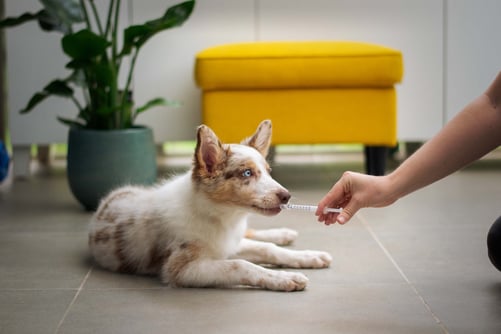How to Care For Your Pet's Medications While Traveling
Published on: July 28, 2022 | Author: Starwood Pet Travel
 It’s not uncommon for dogs and cats to take prescription medications, for chronic or age-related conditions. Giving them their meds simply becomes part of our daily routine. But what if you will be traveling with your pet?
It’s not uncommon for dogs and cats to take prescription medications, for chronic or age-related conditions. Giving them their meds simply becomes part of our daily routine. But what if you will be traveling with your pet?
If you are taking your pet via car, in-cabin or taking their medication with you on your own flight then it's more manageable than if your pet is flying as cargo, unaccompanied and you try to ship their medication with them.
What are your pet's travel plans?
Are you taking your pet on vacation with you, to visit friends, or some other round trip itinerary of relatively short duration? Or are you moving your house to another country?
If you’ll only be gone a few days, your primary concern is packing enough of your pet’s medications to last – plus a bit more, in case your plans change. If the medication must be refrigerated – insulin, for example – you can use a small, insulated travel cooler with a frozen ice pack to keep the drugs cool. This is especially easy if you’re driving to your destination. It’s a good idea to pack a few sandwich bags, too, in case you need to replenish your ice supply along the way.
But you have to think ahead. The friend you’re visiting will certainly have a refrigerator, but if you’ll be staying in a hotel, be sure to book accommodations with an in-room fridge. In some places, in-room refrigerators automatically shut off when the room is unoccupied to conserve electricity, so you’ll need to make other arrangements for your pet’s meds.
It gets trickier if you’re flying.
If you are taking your pet's medication onboard with you in your carry-on bag, you are allowed but need to keep some things in mind. TSA (the Transportation Security Administration), is responsible for inspecting passengers and carry-on luggage at American airports. Oddly enough, they don’t even require that medications be labeled. However, states have individual laws pertaining to prescription medication labels, so you will need to check and make sure you are compliant. The general rule of thumb for pet medications, is that it should be clearly labeled with their pet details, microchip number and administration and dosage instructions.
Normally, the TSA doesn’t allow liquids to pass through security checkpoints, but they make exceptions for liquid medications. Your ice pack is OK, too – as long as it is frozen. Melting ice becomes an unauthorized liquid. So plan accordingly. If your flight is lengthy, ask for some fresh ice cubes to replenish your supply. Or ask if your pet’s medication and ice pack can be stowed in the plane’s fridge until it’s time to depart. (DO NOT forget to retrieve it, though!)
You can carry a Sharps container, however, there are special instructions and ultimately it is up to the TSA officer on what they will allow through security. If you have specific questions, you can call the TSA Cares line at 855-787-2227.
It gets even trickier if you’re traveling internationally.
Do your research if you are flying with your pet internationally. Some airlines and countries require special customs procedures or paperwork when transporting medication. This will also vary if you are taking the medication on your person or trying to ship it with your pet as cargo. Not all airlines will accept medication to travel with pets as cargo and if you are traveling at a different time than your pet, you'll need to make other arrangements. In some cases it's easier for you to ship the medication to the destination or make other arrangements so it's there when your pet arrives. Do note that when your pet is flying as accompanied baggage or cargo, there is no way for medication to be administered on the plane. This must be done by you or a pet handler before check in and after arrival and you will need to make arrangements for this.
It's recommended that you make it a priority to find your pet a new vet as soon as you arrive in your new city, so you can get acquainted and maintain your pet’s medication regimen without a hitch.
Quarantine presents additional challenges. Every country has different pet import requirements. Countries considered to be rabies-free often require a quarantine period for incoming pets, depending on where you’ve been living, even if your pet has a current rabies vaccination and has passed a rabies titer test.
So what happens with your pet’s medical needs while they are in quarantine? That also depends on where you’re headed. If your cat or dog requires prescription medication, you should alert the quarantine facility of this. They may require additional paperwork and/or a letter from your veterinarian, stating the reason for medication, type of medication and the dosage. This would be required so that quarantine personnel will administer your pet’s medicine. In some cases you have to supply the medication to the quarantine facility by dropping it off yourself or having it shipped to them in advance. While other quarantine facilities offer a service for a vet to visit your pet and prescribe the medication that way. Keep in mind, that all of these services may cost you additional fees.
It's also important to note that medication in quarantine might only be administered during certain working hours. If this doesn’t match your pet’s current schedule, you’ll need to discuss alternative scheduling or treatment options with your vet before you leave home and see if the quarantine facility can make special arrangements. Lastly, some quarantine facilities will destroy any leftover medication and not be returned to you once your pet is released. Do your homework and make sure you have more medication on-hand in your new home.It's very important to learn as far in advance as possible exactly what is required to bring your dog or cat into your destination country. Assembling all the necessary documents can be confusing and time-consuming, especially of your cat or dog must receive additional immunizations, tests, etc.
The experts at Starwood Animal Transport can handle all the transportation and documentation for your pet’s travel, freeing up your time and freeing you of unnecessary anxiety. You will still need to discuss your pet’s medications and travel plans with your vet, but early preparation will give you untold peace of mind.
Check out our previous blogs on what medications to bring for your dog or cat when traveling abroad.
Starwood Animal Transport has rebranded to Starwood Pet Travel. We are still the same great company with the best team, just now with a slightly different name.
Subscribe to the Blog
Enjoy our content? Get them sent to your inbox!
Subscribe Now!


